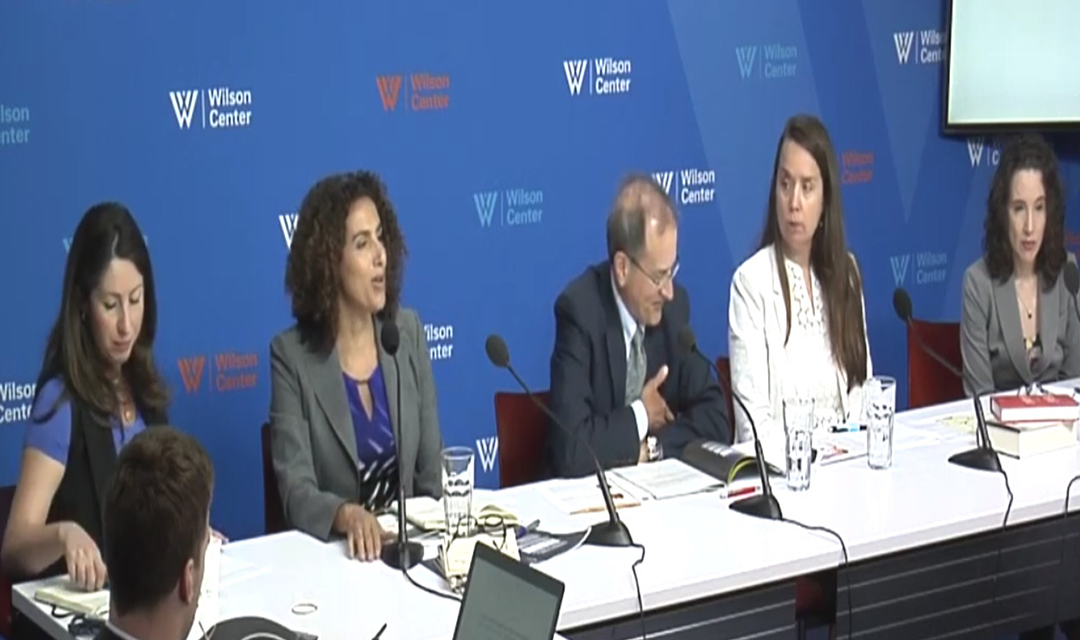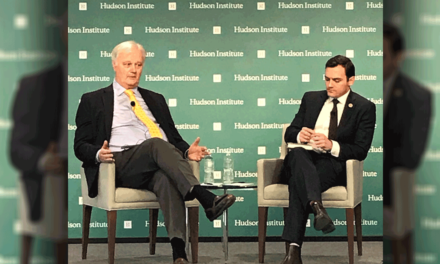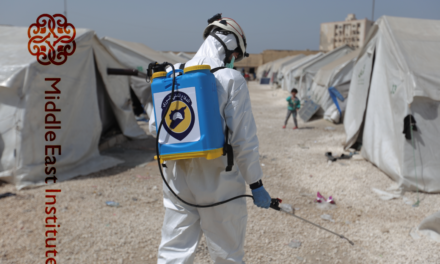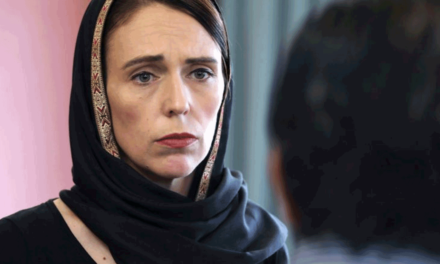Lidija Crnkic, a researcher at the Freemuslim Association, Center for De-Radicalization and Extremism Prevention, attended the Wilson Center’s event on the Syrian refugee crisis titled Strengthening Refugee and Host Communities: Livelihoods, Education, and Social Protections. The panelists included Richard Albright, Sahar Aziz, Amy Austin Holmes, and Jana Mason, along with moderator Merissa Khurma.
Richard Albright, the Deputy Assistant Secretary of the Bureau of Population, Refugees, and Migration for the Department of State, was the first panelist to speak. He discussed what the United States is doing in terms of the crisis, stating that the US aims to find durable, long-term solutions and is actually the leading donor of humanitarian assistance to Syria, having donated over $9.5 billion thus far. He said the US puts great emphasis on supporting self-reliance for refugees and on incorporating them into national economies. The World Bank found that education is key to preventing future intergenerational poverty, which is a problem that desperately needs to be addressed as 40% of school-age Syrian children in the Middle East are not enrolled in school. This percentage gets larger and larger as you move onto secondary and post-secondary education. He stated building new schools, training teachers, providing primary health care, and incorporating more refugees themselves into development programs would be positive initiatives to undertake. He also emphasized the US’s commitment to enabling safe and voluntary repatriation, and that pressuring refugees to return to Syria will lead to further displacement as the current conditions are not right for large scale returns.
Jana Mason, the Senior Advisor for External Relations and Government Affairs at the UNHCR, covered statistics about the refugee crisis globally and what has been done about it. The current global displacement level is about 70 million people, 40 million of which are internally displaced and 25 million of which have crossed borders. Syria has had 13 million people displaced since the start of the conflict, which is approximately half of the pre-war population. It has 6.2 million internally displaced peoples, only second to Colombia, and is the largest source of refugees, with 6.7 million that have fled the country. She explained that the image the media portrays of huge portions of Syrians still living in refugee camps is inaccurate, and that actually, 93% of Syrians globally now live as part of urban populations. She also explained that because the original three methods of handling refugees, which are returning to the country of origin, local integration in the host country, or third country resettlement were not working, that a new approach was developed with the Comprehensive Refugee Response Framework. This new approach focuses on fostering self-reliance for refugees and providing more support and funding to host countries.
Sahar Aziz, the Director of the Center for Security, Race, and Rights at Rutgers University Law School, went over what her research in the Middle East about refugees found and her recommendations on what should be done. A big point for her was that the international community needs to give support to countries where the largest numbers of refugees are, which are the countries that neighbor Syria. For example, Jordan has taken in over 1 million Syrian refugees and needs greater assistance as the 200,000 work permits it created (only 104,000 of which were actually given out) is nowhere near enough. 80% of the refugees in Jordan live below the poverty level. She mentioned how the refugees she talked to had a desire for work, for education, and to return home one day. Her recommendations for the US were to admit more refugees, develop more self-reliance programs, and increase funding to humanitarian projects, especially local initiatives rather than only large NGOs. However, this funding needs accountability and monitoring to ensure it is being spent in helpful ways and is not being used in a corrupt manner.
Amy Austin Holmes, an Associate Professor of Sociology at the American University in Cairo, discussed her experience on the ground in Syria, specifically in the northeastern portion of Syria that is under control of the Syrian Democratic Forces, the group backed by the US and other western nations. She stated zeroing out US stabilization funding is a mistake for both humanitarian and security reasons, and that there is a window of opportunity now to provide more assistance to Syria since the Islamic State Caliphate has been defeated. She talked about how the city of Raqqa, which has been free from ISIS for over a year now, has only been 20% demined, and that there is so much to be rebuilt and done. 43 schools there were destroyed and only 36 are still functional. An enduring defeat of ISIS will require investments in education. Investments need to be made because according to UN scenarios, renewed fighting could displace 36,000 and 450,000 people.
To conclude, the panelists all had different background experiences and perspectives to bring to the table. However, there were some main points they all seemed to have in common. They all stressed the importance of self-reliance for refugees and on providing them with education and healthcare, which will be beneficial to refugees whether they decide to stay and continue contributing to their host countries or decide to return to help rebuild Syria. On that note, they all agreed that if refugees do return, it needs to be under the right conditions, because a mass return now when the country is still unstable would just lead to further displacement. There was also a consensus that the international community needs to do more to support refugees, especially in the countries surrounding Syria.















